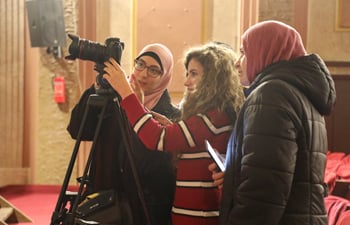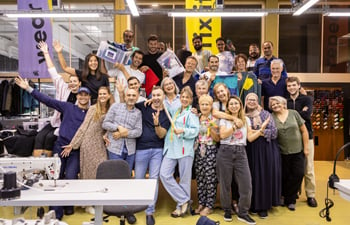About 42% of Kenyans live in poverty, mostly in rural areas and in the slums of major cities. When products and services are available, they lack the cash to purchase them. This brings the local economy to a halt. That's why Grassroots Economics introduced digital community asset vouchers with a value equal to that of the Kenyan Shilling. Farmers and groups create their own digital coins (community asset vouchers) redeemable for their goods and services, and use them to purchase other neighbourhood services and products such as labour, training and transportation. This stimulates trade, increases financial security and improves the living conditions for users.
Maarten Derksen, DOEN Foundation programme manager, explains why DOEN decided to support this pioneer back in 2014, what Grassroots Economics means for the region, and how other countries can also benefit from this system.
Hi Maarten. The DOEN Foundation has been supporting Grassroots Economics since 2014. Back then, a community currency was really something new. What convinced DOEN to fund this project?
"Globally, there have been several projects for local currencies. DOEN has supported several of them over the years. What made Grassroots Economics so special was that they were the first party to apply it to a disadvantaged community - the slum dwellers of Mombasa in East Africa."
Grassroots Economics has developed considerably in recent years. What do you think is the most important thing they have accomplished in all that time?
"At the present time, more than 100 Community Asset Vouchers have been created and more than 70,000 people have used the Community Asset Vouchers. Transactions worth $300 million have already been made, all of which has been spent within the local economy. Digitizing these formalized commitments has really allowed different communities to exchange services and products with their own vouchers. It has also offered numerous new opportunities, such as farmers delivering food directly to city residents. The currency has made the food system more accessible.”
In addition to making it accessible, Grassroots Economics aims to make the local food system more sustainable. Can you tell more about this?
"With DOEN's latest funding, Grassroots Economics has promoted cheap food, more sustainable agriculture and shorter supply chains, and made them more affordable. Farmers supply food to cities in exchange for digital coins, and in return city businesses provide services for the farmers. Farmers use the credits to purchase better seeds or advice on sustainable farming methods, leading to more sustainable production and sales. 26,000 farmers have been involved specifically to create and improve the local food system. With the Red Cross and the World Food Programme embracing digital payments, the user base will only increase."
Do you think Grassroots Economics' model could be of value in other countries as well? Are there plans to expand it, for example?
"Certainly, Grassroots Economics has a website for people to create their own vouchers at https://sarafu.netowrk as well as an open source model and actively makes the knowledge, software and structure available to others - for projects in Hong Kong and South America, for example. Thanks to a partnership with the Red Cross, pilot schemes are also being conducted to replace cash transactions for aid by creating local currencies. Instead of providing money or goods from outside, people are given digital coins that they can spend on products and services in their own communities. It shows that the system can be of value anywhere in the world."
If you want to know more about Grassroots Economics, you can visit the website or watch the animated video below. This clearly explains how this pioneer's digital currency is driving the local economy and giving people a better life.


